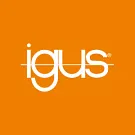3D printing and injection moulding often differ in terms of their cost-effectiveness: 3D printing often pays off from a small number of units. The production of components with machine-made injection moulds is only worthwhile from a quantity of more than 10,000 components. 3D printing in particular scores points in the test phase of applications with its high production speed and immediate readiness for use. Depending on the design, parts are ready to ship in one to three days and can be easily ordered in the online 3D printing service. For its prototype, ZenRobotics also used 3D-printed plain bearings for the aluminium axis with a grooved profile. The company then decided to produce the components in larger quantities via injection moulding. The decisive factors were the variety of materials and the low unit costs associated with injection moulding. The final plain bearings were manufactured from iglidur J2. At around €5/piece, the injection-moulded component cost only a tenth of the SLS part (approx. €49/piece) and the tool paid off after 100 pieces. The robust plastic has good mechanical specifications, is cost-effective and offers good media resistance. In addition, the integrated solid lubricants make external lubrication of the plain bearings superfluous.


